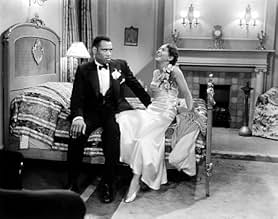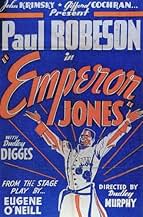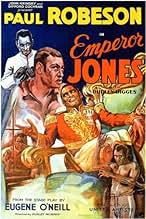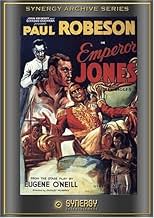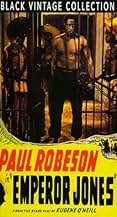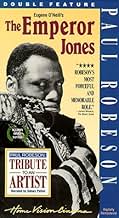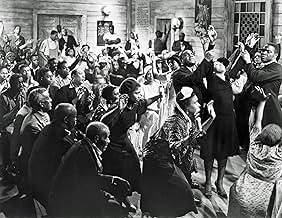Agrega una trama en tu idiomaUnscrupulously ambitious Brutus Jones escapes from jail after killing a guard and through bluff and bravado finds himself the emperor of a Caribbean island.Unscrupulously ambitious Brutus Jones escapes from jail after killing a guard and through bluff and bravado finds himself the emperor of a Caribbean island.Unscrupulously ambitious Brutus Jones escapes from jail after killing a guard and through bluff and bravado finds himself the emperor of a Caribbean island.
- Dirección
- Guionistas
- Elenco
- Premios
- 2 premios ganados en total
- Jeff
- (as Frank Wilson)
- Lem
- (as George Stamper)
- Carrington
- (sin créditos)
- Stick-man
- (sin créditos)
- Extra in Nightclub Scene
- (sin créditos)
- Court Crier
- (sin créditos)
- Pianist
- (sin créditos)
- Marcella
- (sin créditos)
- Young Tap Dancer
- (sin créditos)
- Treasurer
- (sin créditos)
- Extra in Nightclub Scene
- (sin créditos)
- Extra in Nightclub Scene
- (sin créditos)
Opiniones destacadas
The basic idea is that Brutus Jones, by a very improbable chain of events, goes from being a railway porter to a convict to the 'emperor' of a Caribbean island. The production is mediocre, and most of the other characters are routine, although the cast is fairly good under the circumstances. Robeson keeps it from falling apart by being convincing in the many different stages of his character's life - he shows quite a range of acting abilities in a short film.
And he is basically the only reason to watch. The talented Robeson apparently never had many chances at really good roles (whether that was because of his race, or for some other reason), and it's too bad that he never got the chance to show what he could do in a quality film, since he does quite a good job here without much to work with.
Eugene O'Neill's allegorical fable comes alive in this unique and intriguing film, recently restored by the Library of Congress. The legendary Paul Robeson dominates the film as a man who abandons his wife & Baptist upbringing to worship himself, wallowing gleefully in sin & violence as long as it furthers his goal for power & riches - the chance to become an emperor of his own tiny domain is merely the latest opportunity in a serendipitous sequence to be exploited.
Robeson's athletic physique, magnificent singing voice, accomplished acting skills and over-sized personality make him the ideal choice for the complex role. Whether leading chained prisoners in song, using brains & bravado to seize his little kingdom, or slyly peering at himself in a succession of mirrors as he enters his throne room in full military regalia, Robeson is never less than fully entertaining.
Fredi Washington shines in her small role as Robeson's faithful wife. Dudley Digges is appropriately unsavory as the white trader with whom Robeson must do business in order to keep his throne.
Movie mavens will recognize a young Moms Mabley as the owner of a New York City nightclub; an even younger Harold Nicholas (of the Nicholas Brothers) as a boy tap dancer & the wonderful Rex Ingram as Robeson's Court Crier - all uncredited.
This film should be considered as a product of its times; it makes no pretensions towards political correctness.
***********************
O'Neill's play is obviously based on the historical Henri Christophe (1767-1820), the former slave who, after being involved in the bloody revolution against the French and the assassination of his predecessor, became president of northern Haiti in 1807 and its self-proclaimed king in 1811. Despotic & brilliant, King Henri enjoyed a reign of enormous brutality and opulence. He built for himself 6 châteaux, 8 palaces and the massive Citadelle Laferrière, still considered one of the wonders of the age. Christophe supported himself with a fabricated nobility consisting of 4 princes, 8 dukes, 22 counts, 37 barons & 14 knights. After a paralytic stroke left him disabled, the people rose in revolt and Christophes followers fled. Naturally reluctant to face the wrath of his former subjects, Christophe shot himself with a silver bullet.
Once we arrive on the island, however, and are confronted by Dudley Digges as a stage Cockney and other theatrical contrivances, the narrative's admirably headlong pace not only slows down considerably, but the movie itself starts to fall apartalthough we still have some great moments as the vain Jones takes over the kingship and attempts to bleed the natives white.
The original play has the white merchant character Smithers played here by Dudley Digges as the eyes of author O'Neill who narrates the first scene in flashback. Here we have a straight narrative with a backstory added. If you think that the backstory looks something like Porgy And Bess that's because the screenplay was written by Dubose Hayward the original author of that work before the Gershwin brothers set it to music.
Back in those days being a Pullman porter was a status symbol among black people, the first labor union organized that gained decent wages and collective bargaining rights for black people was the Brotherhood of Sleeping Car Porters. When Brutus Jones kills his friend in that crap game in a fight over a woman, he's not just a fugitive, he's lost a lot of standing among his peers. But in fleeing to that Caribbean island where the natives are descended from escaped slaves who still retained some animist beliefs from Africa, he's got it all over this crowd and reasserts himself with nerve, knowledge, and a little trickery and a bit of help from Dudley Digges's character.
Although he did not originate the role, Paul Robeson debuted with it on the London stage and the actor who Eugene O'Neill handpicked to originate the part, one Charles Gilpin faded into obscurity. Of course there's also no singing in O'Neill's Emperor Jones, but Robeson's bass/baritone gets a few good songs in as well, from hymns, to Negro spirituals, to some convict laments. Robeson was always a powerful performer no matter what you think of his politics.
This version of The Emperor Jones has as much Hayward as O'Neill, still what O'Neill was trying to convey comes out in a glorious triumphal performance by Paul Robeson.
¿Sabías que…?
- TriviaFredi Washington had to reshoot her scenes wearing dark make-up when the Hays Office deemed her as appearing too light-skinned in the first rushes. They feared audiences would think Paul Robeson was embracing a white actress.
- ErroresWhen Jones lands on a Caribbean island, there are prickly pear and San Pedro cacti on the beach, neither of which are found in the Caribbean.
- Citas
Brutus Jones: I's got five lead bullets in this gun good enough for common bush niggers. And after that, I's got this silver bullet left to cheat 'em outta gettin' me. I tells 'em, when the time comes, I kills myself with it. That's 'cause I'm the only man in the world big enough to get me.
- Versiones alternativasThe 72-minute version has different opening credits. In the original version, the title reads "The Emperor Jones" in uppercase (capital) letters. In later prints of this film, including the 72-minute version nearly always screened on TV, the title reads merely "Emperor Jones" , in lowercase letters.
- ConexionesEdited into SanKofa Theater: The Emperor Jones (2022)
Selecciones populares
- How long is The Emperor Jones?Con tecnología de Alexa
Detalles
- Fecha de lanzamiento
- País de origen
- Idioma
- También se conoce como
- El emperador Jones
- Locaciones de filmación
- Eastern Service Studios, Astoria, Queens, Nueva York, Nueva York, Estados Unidos(Kaufman Astoria Studios since 1982)
- Productora
- Ver más créditos de la compañía en IMDbPro
Taquilla
- Presupuesto
- USD 263,000 (estimado)
- Tiempo de ejecución1 hora 12 minutos
- Relación de aspecto
- 1.37 : 1
Contribuir a esta página


